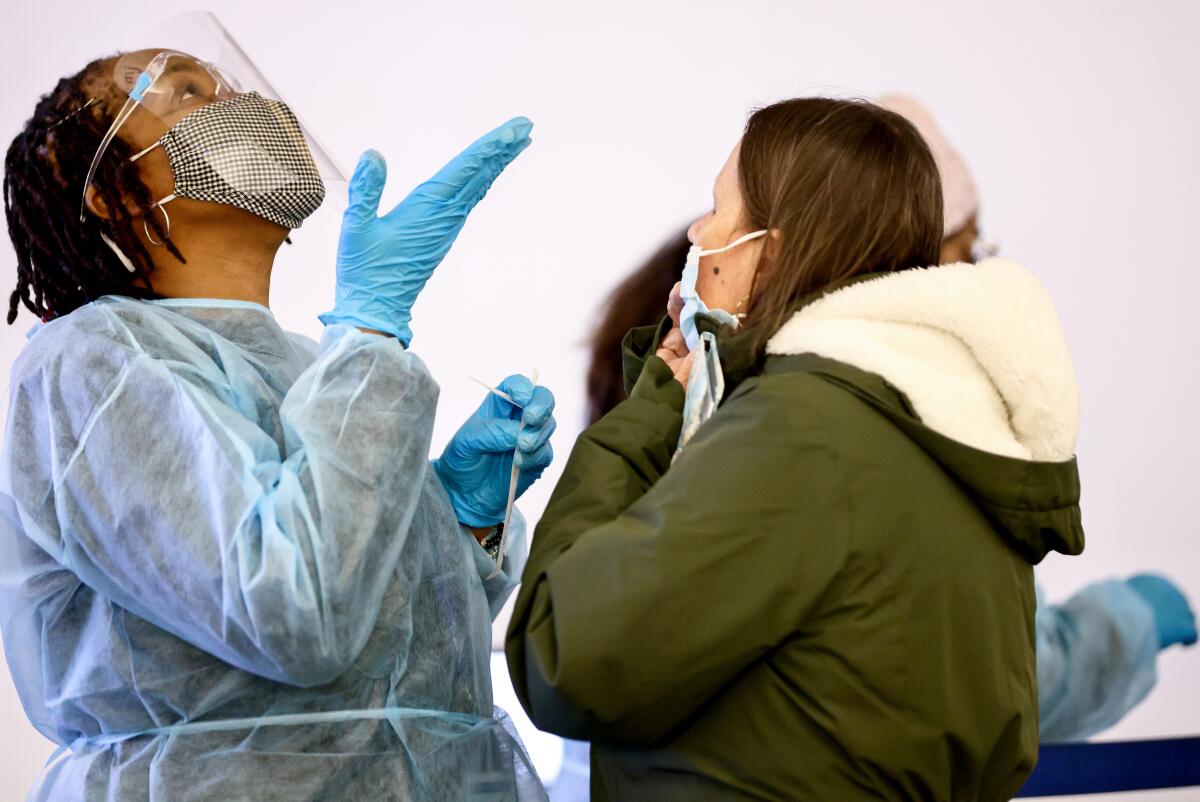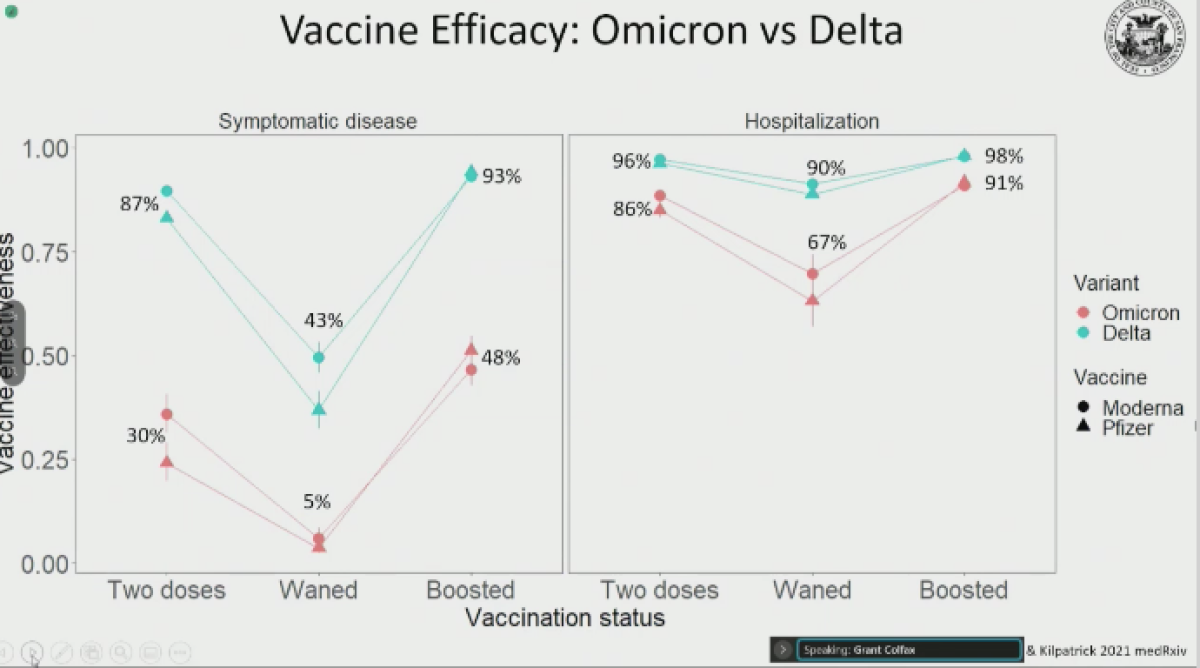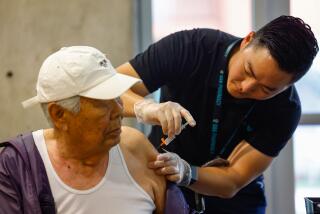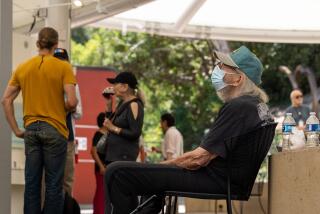Why booster shots give dramatic protection against California coronavirus surge

- Share via
Since the Omicron variant was discovered, officials have said the best defense is vaccinations and getting booster shots.
So how much does vaccine effectiveness fall if you don’t have a booster?
San Francisco Health Director Grant Colfax recently presented early data to city health commissioners showing why getting a booster is so essential.
Big gains in effectiveness
According to the data, while the primary Pfizer or Moderna vaccine series confers about 86% effectiveness against hospitalization shortly after the second dose following an Omicron infection, it falls to 67% as immunity wanes, but rises back to 91% following a booster.
A booster shot results in “a dramatic increase in improvement with regard to ... protecting against hospitalization — 91% — nearly the level it was with Delta,” Colfax said.
People should be aware that vaccine effectiveness against symptomatic disease from Omicron is reduced compared with Delta, Colfax said. Against Omicron, vaccine effectiveness against symptomatic disease just after the second dose of a Pfizer or Moderna shot was 30%, falling to just 5% when immunity wanes, but climbs to 48% following a booster shot.
The vaccines were more effective against Delta. Vaccine effectiveness against symptomatic disease was 87% just after the second dose of a Pfizer or Moderna vaccination series, falling to about 43% when immunity wanes but climbing back up to 93% after a booster shot.

British data
The data presented by Colfax is one of a number of early reports, and other reports show different numbers. Early data from Britain, for instance, show that vaccine effectiveness against symptomatic infection from Omicron is 88% shortly after the second dose of a Pfizer vaccination, falls to 34% about six months after the second dose, but rises to 76% after a booster shot.
By comparison, the British data show that, against Delta, vaccine effectiveness against symptomatic infection was also 88% shortly after the second dose of a Pfizer vaccine, falls to 64% about six months after the second dose, and then rises to 93% following the booster.
A peak in early January?
The U.S. Centers for Disease Control and Prevention says early forecasts suggest a large surge of infections could be reached as soon as early January, and “the peak daily number of new infections could exceed previous peaks.”
Dr. Anthony Fauci, President Biden’s chief medical advisor, said in an interview on ABC that he expected that, during this wave, almost everyone is “either going to get infected, particularly the unvaccinated, or be vaccinated.”
“And the vaccinated people, particularly the boosted people ... will either be protected from infection, or if they do get infected, they’ll have a relatively mild course of infection,” said Fauci, who expected a peak in Omicron cases soon, within a matter of weeks, followed by “just as dramatic a decline.”
Fauci called Omicron transmissibility’s extraordinary.
“Certainly, this is unprecedented to see this rapidity with which any individual virus spreads throughout the world. It is really extremely unusual,” Fauci said.
In various television interviews recently, Fauci also added that family and friends can expect relatively safe and enjoyable Christmas gatherings, without masks, if everyone age 5 and up is vaccinated and, among those eligible, has received a booster shot. Fauci suggested that attendees get tested before gathering.
“If tests are available, by all means go the extra step, go the extra mile to get testing, which we’re recommending just to get that extra added cushion of alleviation of concern,” Fauci told NBC. “But if you don’t have the availability of the test and you are fully vaccinated and boosted, you should feel comfortable having a holiday meal or gathering with family members who are also vaccinated and boosted,” Fauci added.
Concerns for unvaccinated
Unvaccinated people are at highest risk of severe illness from any coronavirus infection. The first apparently publicly confirmed Omicron case in the U.S. that has resulted in a death was reported in Harris County, Texas — a man in his 50s who was unvaccinated, had previously survived a coronavirus infection, and had underlying health conditions that placed him at higher risk of severe complications.
The CDC has warned that hospitals could be further burdened with many healthcare workers forced to isolate due to their own coronavirus infections, as well as illnesses from other causes, such as flu.
San Francisco is probably two weeks behind Britain in its Omicron wave and a week behind New York “in terms of increases,” Colfax said.
Colfax said the reproductive rate of Omicron is estimated to be 10, meaning on average, an infected person will transmit the virus to 10 other people.
“That is a phenomenally high infection ability of this virus and far higher than Delta, and of course, much higher than the original COVID-19 strain that we were dealing with last year,” Colfax said.
More to Read
Sign up for Essential California
The most important California stories and recommendations in your inbox every morning.
You may occasionally receive promotional content from the Los Angeles Times.














